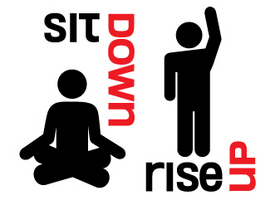by Evelyn Cash
I was voted “most competitive” in my high school senior yearbook. I
would get a 95% on a physics test and be happy with it until I saw that
a friend of mine got a 97%. I like to call this the “Comparing Mind”; it’s the state of
mind that takes a great result (hey, I’d kill for a 95% in college
physics) and makes it crap when it compares it to someone or something
else. Comparing myself to others is a habit I have, a bad one that seems to get better and worse in cycles.
As
humans, we have a natural tendency to compare the various objects in
our lives and there is nothing inherently wrong with the Comparing
Mind. The way I’ve sometimes heard this explained in Buddhism is
to take a an object, say a flower and hold it up on its own. Seen in
this way,
the flower is simply a flower. But when you hold up a larger plant next
to it, the flower seems small. When you hold up a tiny flower next to
the first one, that same flower seems large. The size of the flower
only exists in relation to other things. The flower is not inherently
large or small. As long as we’re talking
about inanimate objects,
comparing things isn’t so bad. It can help to say things such as “I
thought that small flower was very pretty,” or “hand me the big
marker.” Not such a big
deal.
The situation is completely different with people.
Once we get it into our head that something about us is “worse” than
another person, it can set off a chain reaction which is difficult to stop. I attended a
Dharma talk given by Yongey Mingyur Rinpoche a few years ago and his talk touched on our brains’ amazing reactivity. One of the
parts of his talk that has really stuck with me was when he described the
thoughts that go through our head once we’ve decided that we’re “ugly.”
He talked about how, once that thought gets started, the neurons in our
brains start “gossiping” and talking it up until we’re positive that
we’re not only hideous but that everyone around us knows it and talks
about us behind our backs.
Comparing
Mind works
exactly the same way. For example, I run about 4 or 5 times a week but
it never fails that on my appointed “rest day” I’ll see a runner while
I’m out walking the dog with my husband and instantly I think that not
only should I also be running but that I’m just being lazy by taking a
day off, obviously that
person didn’t take today off! What I’m clearly not taking into account
is the fact that I have no idea what that other person’s running
schedule is like and that it’s completely healthy and appropriate to
run 3-5 times a week and take a few days off to avoid injury If I
don’t catch it, my Comparing Mind will run through it’s program at
light speed and I end up thinking that the other person must be a much
more dedicated runner than I am. On the flip side,
it also doesn’t help to think that you’re somehow better than someone.
You may start thinking that you’re the smartest and most
capable person in your work group and that you deserve the important
projects. Then, you get a project that’s a bit over your head and when
someone else takes it you just can’t believe it. You’re smarter than
them! You deserved that! In reality, that other person my be perfect
for the job but you were so busy thinking of yourself as “better” that
you wanted all the projects… even the ones you really couldn’t
handle. Plus, you get yourself all bent out of shape and depressed when
really it would be a lot less painful to just admit that different
people are better at
different things and move on happy that you don’t have to do the
difficult work.
The bottom line is that it’s best to
just let go of Comparing Mind as it relates to how we perceive ourselves and others. It can only lead to clinging
and
to suffering and it’s not worth it. This has been a very difficult
practice
for me. As I’ve said, I’ve been a competitive, comparing person for
so many years that I often don’t even realize I’m doing it. My neurons
are so used to gossiping about how *other* people are better or worse
that they don’t even bother to let me know they’re doing it. I often
only
see it when I lose my cool entirely and break down into either sadness
or anger or even reticule towards another. It usually takes
an explosion for me to even realize that the reaction had been going on
at all.
I’ve decided to take particular notice of
Comparing Mind over the next week. I’ve taken up this practice before,
when I find myself falling into my old comparative/competitive habits
and I’ve noticed that it can be very helpful to be on the look out for
these sorts of reactions before they occur. I would challenge anyone
who happens to read this to try this practice just to see if that
subtle
comparison with others is causing suffering.

